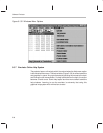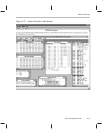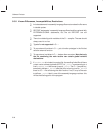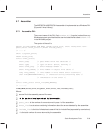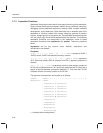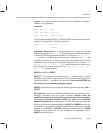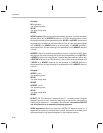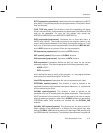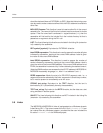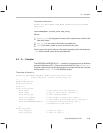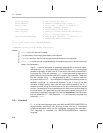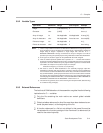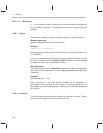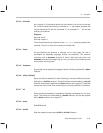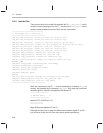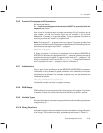
Linker
5-38
should be declared there as EXTERNAL (or REF). Note that this technique can
also be used to make constants defined with the EQU statement available to
other files.
INCLUDE
filename
: This directive is used to insert another file in the current
assembly file. The name of the file to be included must be enclosed in double
quotes. If the file name itself is enclosed in angled brackets (<>), then the
assembler will first look for the include file in the include directory list that is
passed as an argument during the DLL call.
LIST: The lines following this directive are included in the listing file (extension
.lst) created by the assembler.
REF symbol[,symbol]: Equivalent to EXTERNAL directive
label RESB expression: This directive is used to reserve the number of bytes
indicated by expression, starting at the current RAM address. Label is given
the value of the current RAM address.
label RESW expression: This directive is used to reserve the number of
words indicated by expression, starting at the current RAM address. label is
given the value of the current RAM address. If the current RAM address is not
EVEN, the assembler increments it by 1 before allocating the desired amount.
(Note that RAM locations are accessed by their BYTE address in MSP50P614/
MSP50C614 assembly language, i.e., word 1 is at address 2, etc...)
RORG expression: Marks the start of a RELATIVE segment code, i.e., a
segment that can be relocated by the linker, expression is an arbitrary number,
but it must be present or an assembly error will occur.
STRING
text_string
: Equivalent to the TEXT directive, but the text is
terminated by a 0. (automatically done by the assembler)
TEXT
text_string
: Equivalent to the BYTE directive, but the data are a text
string enclosed in double quotes.
UNLIST: The lines following this directive are NOT included in the listing file
(extension .lst) created by the assembler.
5.8 Linker
The MSP50P614/MSP50C614 linker is implemented as a Windows dynamic
linked library (DLL). The current name of the DLL file is link6xx.dll. It can
be invoked from any Windows program, provided that the user included the
file called link6xx.lib in the Windows project.



